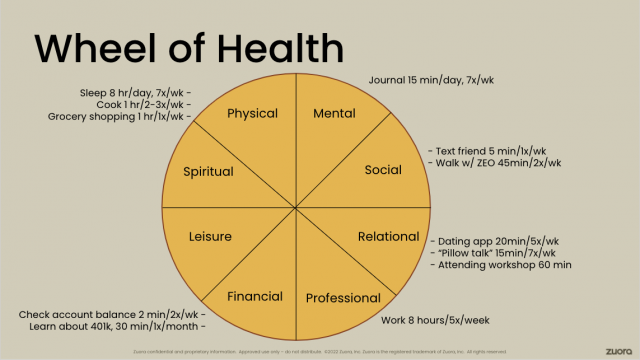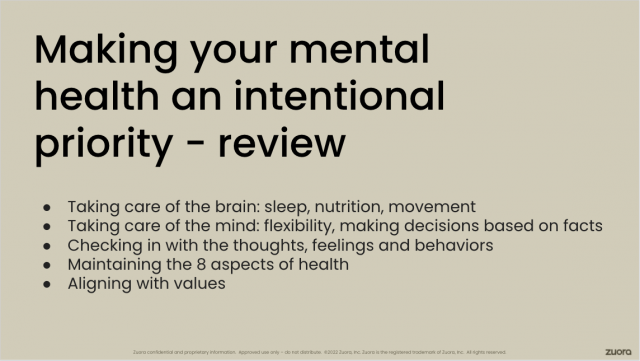It’s Mental Health Awareness Month; a time for all of us to pause and consider the importance of mental health not only in May, but all year round. It’s talked about a lot, but it remains unclear to many what mental health is and how to better care for it. So with the help of our Diversity & Inclusion Org and guest speaker Dr. Hsiao-Wen Lo (駱筱雯), PhD., we explored essential principles and practical skills to better understand, prioritize and take care of our mental health, including the question:
Are you engaging in intentional self-care to maintain your mental health, or are you engaging in after-care strategies in the wake of a life disruption?
The session sparked great conversations and thoughts from ZEOs. Those, along with the great insights and strategies from Dr. Lo, gave ZEOs an opportunity to reflect and identify where they can be more thoughtful and active in maintaining great mental health.
“One strategy that I took away was the idea of doing one thing differently a week to help the brain stay flexible. It wasn’t something I had ever thought of, but I definitely see the importance of it. There are so many changes—remote work allowed my husband and me to move to an area where we were able to purchase a home and are now adapting to a new city. Keeping our brains flexible helps with all of the new changes we face.”
— Steph Smith, Senior Brand Design Lead, Remote Florida.
But for those times when you find yourself struggling or caught in an unhealthy cycle, Dr. Lo suggests a Thought Record. A Thought Record is a collection of data about specific moments in time—the when, where, what, and who—then recording your thoughts, feelings, and behaviors/physical reactions, throughout that specific point in time. This practice will increase your self-awareness and mindfulness to help you evaluate where you are and how you’re doing.
Need more wisdom from this session? Keep reading…
Best Coping Strategy?
Dr. Lo shared that often she is asked what the best coping strategy is for managing your mental health and wellness. Answer? There isn’t one. The best approach is a diversified set of behaviors. Are you feeling stressed? A relaxing glass of wine or tea is great today. The next time you’re feeling stressed, pick another one of your strategies, like working out. The next time? Ice cream. After that? A great conversation with a trusted friend. A coping strategy can become a disordered behavior when it’s repeated to excess. Keep that diversified set of coping strategies close by and constantly rotating!

Finding Balance
There were so many great takeaways from this session. One of them was Dr. Lo’s presentation of the Wheel of Health. There are eight (8) dimensions on the wheel, important to maintaining good mental health and wellness: Physical, Mental, Social, Recreational, Academic/Professional, Financial, Leisure, and Spiritual.
With eight dimensions to maintain and limited spare time in a day—many of you may be feeling like Steph, who shared during the session, “it’s a little intimidating to balance all of these every day…It can feel overwhelming.”
We agree, Steph! A great way to tackle that overwhelm is mapping where your time is on your wheel and identifying where and how you can reallocate your time to achieve better balance. Trust yourself! Dr. Lo says you’re likely taking care of several of your dimensions subconsciously. Now, add some intention into the mix.

What are a couple of things I can do today to attend to my mental health?
Take care of your brain. Be sure to get enough sleep, proper nutrition/hydration, and physical activity.
- Sleep deprivation causes our brain to be more sensitive to negative emotions (sadness, anger, fear). Are you anticipating a stressful day or week? If so, have a good, balanced meal and GO TO SLEEP!
- Did you know that active movement for 5 (five) minutes after each hour of sitting at your workstation, does more for your mental health than working an 8 (eight) hour day and going to the gym for an hour or more? This isn’t a dig at going to the gym after work, it’s a call to make sure that you are engaging in physical activity throughout the day.
Take care of your mind. Reset your mind by doing 1 (one) thing differently each week. While structure and routine are preferred for the mind, 20% of nuance can help your mind remain flexible and agile. Use your non-dominant hand for a daily activity. Take a new route to the grocery store. A great sign of mental wellness is mental flexibility – it keeps us in a place where we can best evaluate when a decision needs to be made based on facts (buying a house) versus when a decision can be made based on our feelings (what to wear today).
So, back to the question. Is it self-care or after-care? Dr. Lo says it’s both! It’s self-care and after-care. And it’s also before-care and during-care! A great way to get your power back and take control of your mental health and wellness is diving into the information and tools provided by Modern Health! Log on, take a look, and customize your care!
Interested in building your career with Zuora? Check out our current openings and apply on our Career Site.